|
|
|
Sort Order |
|
|
|
Items / Page
|
|
|
|
|
|
|
| Srl | Item |
| 1 |
ID:
170765
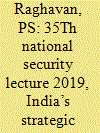

|
|
|
|
|
| Summary/Abstract |
We live in a world in which a post-cold war order is still in the making, as the sole super power shares the global stage with multiple state actors of varying weights, jostling for space to assert their national aspirations.
In this complex environment, India’s foreign policy seeks to maximise India’s political and economic space to further its global ambitions. This includes sustaining the vibrant India-US strategic partnership, forged since the early 2000’s, even while preserving the traditionally strong relationship with Russia from the decades of the Cold War. A comprehensive partnership has also been developed with China, though recent differences have somewhat dimmed its intensity. India needs a combination of domestic capacity building and external partnerships to reconcile the contradictory pulls of strategic cooperation and competition with China. Relations with the US, Russia, Japan and Europe are also elements of this effort. India’s multilateral activism in G-20, BRICS and SCO serve to enhance its room for manoeuvre in the dynamics of the US, Russia, China triangle. India’s strategy in the India-Pacific seeks to promote bilateral, plurilateral and multilateral partnerships in search for a cooperative and sustainable architecture in the region that promotes objective of a multi-polar order.
|
|
|
|
|
|
|
|
|
|
|
|
|
|
|
|
| 2 |
ID:
094444


|
|
|
|
|
| Publication |
2010.
|
| Summary/Abstract |
Since normalising diplomatic relations in 1972, successive Australian and Chinese governments have focused on deepening trade and investment links to such an extent that China now looms as one of the most critical countries on Australia's twenty-first century horizon. For their part, Chinese elites have welcomed closer ties with Australia and have been particularly keen to accelerate China's direct investment in the Australian mining and energy sectors. Since the early 2000s, a number of commentators have argued that Australia has been gradually drifting towards China's sphere of influence in the Asia-Pacific. This trend, they argue, has been reinforced following the election in 2007 of the Labor party government, which has terminated Australia's involvement in quadrilateral talks with the US, India, and Japan; stepped back from commitments to export uranium to China's long-standing rival, India; and intensified Australia's public criticism of Japanese whaling practices. Meanwhile, in 2008, Prime Minister Kevin Rudd made a point of paying a high profile visit to China during his first major overseas journey, but not matching it with a visit to Japan. Is Australia drifting towards China's strategic orbit in Asia? The article examines this question through the prism of three key indicators of realignment and concludes that, while there is some evidence of Australia accommodating Chinese strategic preferences in Asia, there is no indication that it is realigning itself strategically towards China and away from its long-standing ally, the US.
|
|
|
|
|
|
|
|
|
|
|
|
|
|
|
|
| 3 |
ID:
190704
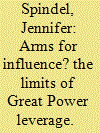

|
|
|
|
|
| Summary/Abstract |
Scholars and policymakers agree that major powers have leverage over their more junior partners. Giving security assistance or providing arms is supposed to increase this leverage. However, major powers often hit roadblocks when trying to influence the behaviour of their junior partners. This article demonstrates that junior partners are often successful in constraining the behaviour of the major power partners, and have particular success in extracting additional resources from their major partners. This article develops the concept of loyalty coercion to explain that leverage is based on rhetorical and symbolic moves, rather than material preponderance. It then uses cases of US arms sales to show that weapons transfers did not lead to US leverage, instead opened opportunities for junior partner influence. The article contributes to scholarly and policy perspectives on alliance management and reputation, and leverage in world politics.
|
|
|
|
|
|
|
|
|
|
|
|
|
|
|
|
| 4 |
ID:
153241
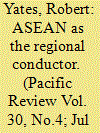

|
|
|
|
|
| Summary/Abstract |
This paper analyses ASEAN's prominence in regional order negotiation and management in Southeast Asia and the Asia-pacific through the lens of social role negotiation. It argues that ASEAN has negotiated legitimate social roles as the ‘primary manager’ in Southeast Asia and the ‘regional conductor’ of the Asia-Pacific order. It develops an English School-inspired role negotiation framework and applies it to three periods: 1954–1975 when ASEAN's ‘primary manager’ role emerged from negotiations with the USA; 1978–1991 when ASEAN's role was strengthened through negotiations with China during the Cambodian conflict; and 1991-present when ASEAN created and expanded the ‘regional conductor’ role. Negotiations during the Cold War established a division of labour where great powers provided security public goods but the great power function of diplomatic leadership was transferred to ASEAN. ASEAN's diplomatic leadership in Southeast Asia provided a foundation for creating its ‘regional conductor’ role after the Cold War. ASEAN's ability to sustain its roles depends on maintaining role bargains acceptable to the great powers, an increasingly difficult task due to great power rivalry in the South China Sea.
|
|
|
|
|
|
|
|
|
|
|
|
|
|
|
|
| 5 |
ID:
156801
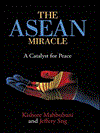

|
|
|
|
|
| Publication |
New Delhi, Oxford University Press, 2018.
|
| Description |
xvi, 264p.hbk
|
| Standard Number |
9780199485253
|
|
|
|
|
|
|
|
|
|
|
|
Copies: C:1/I:0,R:0,Q:0
Circulation
| Accession# | Call# | Current Location | Status | Policy | Location |
| 059257 | 959/MAH 059257 | Main | On Shelf | General | |
|
|
|
|
| 6 |
ID:
005176
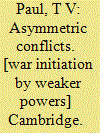

|
|
|
|
|
| Publication |
Cambridge, Cambridge University Press, 1994.
|
| Description |
xi, 248p.
|
| Series |
Cambridge studies in international relations; no.33
|
| Standard Number |
0521466210
|
|
|
|
|
|
|
|
|
|
|
|
Copies: C:1/I:0,R:0,Q:0
Circulation
| Accession# | Call# | Current Location | Status | Policy | Location |
| 036375 | 355.02/PAU 036375 | Main | On Shelf | General | |
|
|
|
|
| 7 |
ID:
159167
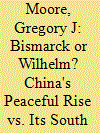

|
|
|
|
|
| Summary/Abstract |
The choice facing China today is whether it will follow the precedent set by Otto von Bismarck—which appears to be its stated goal—or whether it will (intentionally or unintentionally) follow the path of another German leader, Kaiser Wilhelm, and pursue a policy of military growth, territorial and/or maritime expansionism, and a relative disregard for the concerns of its neighbors. The South China Sea will be an important test case, an arena where China's choices will impact its relations with its neighbors and other great powers like the United States.
|
|
|
|
|
|
|
|
|
|
|
|
|
|
|
|
| 8 |
ID:
144960


|
|
|
|
|
| Summary/Abstract |
THE 70TH ANNIVERSARY of the United Nations Organization is an international event of signal importance. Set up as a fundamental element of the international system, the UN remains its cornerstone with no alternatives no matter what its numerous critics are saying in chorus. Today amid the disarray and contradictions of the contemporary world, mankind, if confronted with the task of setting up a universal international structure to preserve peace and security, would have come up with an indifferent result if not a failure. Critics concentrate at individual aspects of the UN activity and talk about details: they stand too close to be aware of the grandiose panorama of this construction, hence their attention to arches and façades
|
|
|
|
|
|
|
|
|
|
|
|
|
|
|
|
| 9 |
ID:
119271
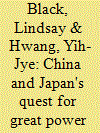

|
|
|
|
|
| Publication |
2012.
|
| Summary/Abstract |
In responding to piracy in the Gulf of Aden, both Chinese and Japanese policymakers have acted as norm entrepreneurs who intend to transform the dominant norms of international society. Chinese and Japanese norm entrepreneurship is grounded in the ways in which foreign policy actors construct and reconstruct their state identity. In China's case, policymakers have projected China's self-image as a responsible and benevolent Great Power that derives from the Chinese conception of Tianxia. Japanese foreign policy actors, on the other hand, have advanced the notion of Japan as a bridge that mediates between East and West, developing and developed states, members and non-members of international society. Although we do not advocate that Chinese or Japanese norm entrepreneurship should be accepted uncritically, we do maintain that there exist opportunities to combine and develop the multiple approaches that different states promote to problems. This article has shown that dealing with Somali piracy is one such case.
|
|
|
|
|
|
|
|
|
|
|
|
|
|
|
|
| 10 |
ID:
122949
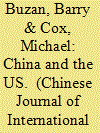

|
|
|
|
|
| Publication |
2013.
|
| Summary/Abstract |
Competing great powers, and the potential for clashes among them when there are changes of place at the top of the hierarchy, are an old story in international relations. Against this realist model of inevitably warlike power struggles stands another idea: 'peaceful rise'. China committed itself to this policy a decade ago, and arguably adopted it as far back as the shift to reform and opening up in the late 1970s. The only other modern great power than can possibly claim to have risen peacefully is the United States. Since there are only two cases of attempted peaceful rise, it is worth asking what parallels can be drawn between the United States and Chinese experiences. Given their different placements in history, with the rise of the United States having taken place between 1865 and 1945, a century earlier than China's current rise, what lessons, if any, can be learned for China from the United States experience? This article looks closely at both the meaning of 'peaceful rise' and the credibility of the United States and Chinese claims to it. It surveys the key points of similarity and difference between the United States and China during their process of rise, comparing contemporary China with the United States of the late 19th and early 20th centuries, not with today's United States. The conclusion sets out six lessons for China and for international society that can be drawn from comparing the two cases.
|
|
|
|
|
|
|
|
|
|
|
|
|
|
|
|
| 11 |
ID:
004787
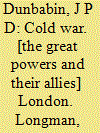

|
|
|
|
|
| Publication |
London, Longman, 1994.
|
| Description |
2v.(xx, 513p.)
|
| Series |
International Relations since 1945
|
| Standard Number |
058249355X
|
|
|
|
|
|
|
|
|
|
|
|
Copies: C:1/I:0,R:0,Q:0
Circulation
| Accession# | Call# | Current Location | Status | Policy | Location |
| 035811 | 327/DUN 035811 | Main | On Shelf | General | |
|
|
|
|
| 12 |
ID:
175553


|
|
|
|
|
| Summary/Abstract |
Military attachés and wartime observers have received surprisingly little attention in international relations. Why do states exchange attachés, permitting uniformed foreigners to gather intelligence on their territory and during their wars? To explain, we adopt a broadly practice-theoretic approach, focusing on the individuals who developed the role by living it, showing how they both innovated a distinct military practice and established institutional legitimacy for attachés. We address an early historical case in which the practice proliferated: the Russo-Japanese War, throughout which observers represented multiple European states, on both sides of the conflict. Sometimes termed the first modern war, the conflict saw Japan's entry into the Eurocentric great power system. In this context, embedded attachés had a dual effect. On the one hand, a professional attaché community established itself: we show how local innovation by embedded officers, in the context of this structurally destabilising event, permitted the creation of a new institutional role that might otherwise have been impossible. On the other, the Japanese made use of the attachés as witnesses for Western governments, observing their performance of great power-hood, as they defeated Russia. The argument has implications for understanding both the military attaché system and communities of practice as such.
|
|
|
|
|
|
|
|
|
|
|
|
|
|
|
|
| 13 |
ID:
161614
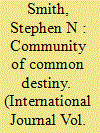

|
|
|
|
|
| Summary/Abstract |
This essay will discuss China’s re-emergence as a great power through the lens of the English School. Following Ian Clark, I reconceptualize international society as a set of historically changing principles of legitimacy. I argue that China’s “new assertiveness” under Xi Jinping is best explained by China’s pursuit of legitimacy in an international arena where norms of legitimate modes of governance, development, and ordering principles have long been defined by the West. Furthermore, this essay will examine one recent development in Chinese International Relations theory, gongsheng, which purports to offer an alternative normative basis for interstate order, and probe its relationship to Xi Jinping’s recent declaration to build a “community of common destiny” in Asia.
|
|
|
|
|
|
|
|
|
|
|
|
|
|
|
|
| 14 |
ID:
182628
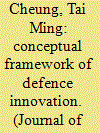

|
|
|
|
|
| Summary/Abstract |
Gaining a decisive technological edge is a never-ending pursuit for defence establishments. Intensifying geo-strategic and geo-economic rivalry among major powers, especially the U.S and China, and the global technological revolution occurring in the civilian and military domains, promise to reshape the nature and distribution of global power. This article provides a conceptual framework for a series investigating the state of global defence innovation in the twenty-first century. The series examines defence innovation in small countries with advanced defence innovation capabilities (Israel, Singapore), closed authoritarian powers (North Korea, Russia), large catch-up states (China and India) and advanced large powers (U.S.).
|
|
|
|
|
|
|
|
|
|
|
|
|
|
|
|
| 15 |
ID:
038482
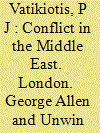

|
|
|
|
|
| Publication |
London, George Allen & Unwin Ltd, 1971.
|
| Description |
xvi, 224p.hbk
|
| Standard Number |
0043270360
|
|
|
|
|
|
|
|
|
|
|
|
Copies: C:1/I:0,R:0,Q:0
Circulation
| Accession# | Call# | Current Location | Status | Policy | Location |
| 008086 | 956.04/VAT 008086 | Main | On Shelf | General | |
|
|
|
|
| 16 |
ID:
086752
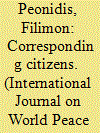

|
|
|
|
|
| Publication |
2009.
|
| Summary/Abstract |
In this article, Filimon Peonidis is concerned with the problems of peace when strong nations or empires flex their muscles on the world stage much the way warlords do within states. He suggests one way to reduce the violence that results from the unilateral behavior of a powerful state towards a less powerful one is through the novel concept of "corresponding citizens." Such corresponding citizens would be elected by smaller countries, e.g. Greece, to serve within the governments of larger powers like the United States or Britain.
|
|
|
|
|
|
|
|
|
|
|
|
|
|
|
|
| 17 |
ID:
180835
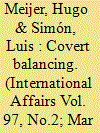

|
|
|
|
|
| Summary/Abstract |
Throughout history, Great Powers have devised balancing strategies aimed at checking the ambitions of rival Great Powers. To do that, they have sought to enter and mobilize alliances and security partnerships with secondary states. Yet, the influence of secondary states on the balancing strategies of Great Powers remains largely under-estimated in the International Relations literature. Contrary to conventional wisdom, we posit that secondary state preferences play a key enabling or constraining role in shaping the balancing choices of Great Powers. We focus specifically on how the adoption of hedging strategies on the part of secondary states affects the balancing strategies of established Great Powers. We argue that when secondary states adopt a hedging strategy established Great Powers are incentivized to engage in what we call ‘covert balancing’. Covert balancing occurs when an established Great Power conceals its security cooperation with a secondary state beneath a cover that is seemingly unrelated to balancing a rising Great Power, thus working around the secondary state's hedging strategy while at the same time helping to generate a latent capacity to balance. We probe our argument by examining US balancing strategy against China in the Asia–Pacific.
|
|
|
|
|
|
|
|
|
|
|
|
|
|
|
|
| 18 |
ID:
168929
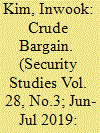

|
|
|
|
|
| Summary/Abstract |
Petro-alignment, a quid pro quo arrangement whereby great powers offer security in exchange for oil states’ friendly oil policies, is a widely used and yet undertheorized energy security strategy. One consequential aspect of this exchange is that great powers choose different levels of security commitment to keep oil producers friendly. With what criteria do great powers rank oil states? How do we conceptualize different types of petro-alignments? What exactly do great powers and oil producers exchange under each petro-alignment type? I posit that a mix of market power and geostrategic location determines the strategic value and vulnerability of individual client oil states, which then generates four corresponding types of petro-alignment—security guarantee, strategic alignment, strategic favor, and neglect. Two carefully selected case comparisons—Saudi Arabia and Kuwait in 1970–91, and Azerbaijan and Ecuador in 1990–2013—show how great powers created, utilized, and maintained petro-alignments under the unique logic of oil markets and across varying geopolitical settings. The findings have important implications on great powers’ grand strategies, strategic behaviors of oil states, and the role of oil in international security.
|
|
|
|
|
|
|
|
|
|
|
|
|
|
|
|
| 19 |
ID:
170796
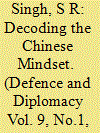

|
|
|
|
|
| Summary/Abstract |
At the behest of Hu Jintao, the president of the People’s Republic
of China (PRC), top Chinese scholars carried out a study on factors
that had enabled the major powers to grow very rapidly since the
15th century.1
The study was ordered on November 24, 2003, during
the Communist Party of China (CPC) Central Committee Political
Bureau’s group session and the final work was completed in 2006
|
|
|
|
|
|
|
|
|
|
|
|
|
|
|
|
| 20 |
ID:
126629
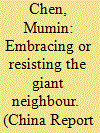

|
|
|
|
|
| Publication |
2013.
|
| Summary/Abstract |
Since 2008, President Ma Ying-jeou and his Kuomintang (KMT) government in Taiwan have adopted the policy of seeking greater economic cooperation with China in exchange of reducing confrontation across the Taiwan Strait. By endorsing the 'One China' principle, the KMT government successfully resumed dialogue with Beijing and signed 18 agreements, ranging from allowing Chinese tourists to visit Taiwan to establishing a closer economic partnership. Yet President Ma's self-claimed achievements in cross-strait peace received severe criticisms from the opposition Democratic Progressive Party (DPP), which accused KMT's pro-China policy as selling out the democratic Taiwan to an authoritarian regime. This article examines the on-going debates between the ruling KMT and opposition DPP about proper strategies towards China, and how such debates make it unlikely for Taiwan to form an effective policy on cross-strait affairs. The differences between KMT and DPP on their respective China policies have led to prolonged distrust between both parties, and between DPP and Beijing. Facing an increasingly powerful China, both parties are short of better ideas to convince voters that their current policy will effectively secure Taiwan's sovereign status or will be beneficial to enhancing Taiwan's interests in the long term.
|
|
|
|
|
|
|
|
|
|
|
|
|
|
|
|
|
|
|
|
|